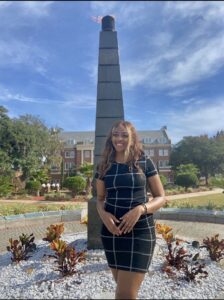
Florida A&M University is widely known for its Rattler pride, famed Marching 100, LeBron-branded sports teams, alumni, unity and its position on the highest of Tallahassee’s seven hills.
It is a completely different experience seeing it and then becoming a part of it.
Coming from a predominantly White and Latin institution in Greeley, Col., to a historically Black university, was a breath of fresh air I didn’t realize I was even missing. Being one of the only Black students in my class, to becoming a part of the majority, shifted my engagement and perception of higher education in a way that didn’t originally feel attainable.
There is a new level of empowerment that comes from not being isolated on campus but fully engaged in the advancement of self through education, both inside and outside of the classroom.
According to a survey completed by Inside Higher Ed, at a PWI, 93 percent of the 13,000 students who responded to the survey reported feeling physically safe at their institution, but that perception varied among different demographic groups. Among Black students, 14 percent said they disagreed or strongly disagreed with the statement “I feel physically safe at my institution.”
“It’s just comforting and refreshing that I can just be 100% me without judgment or fear of anything,” Jaela Stephens , a third-year transfer student from Grand Canyon University, said.
There is a different level of comfort I felt not only physically but emotionally. There is a sense of healing I believe that brings a lot of the FAMU students together through the discovery of self within the community.
“It’s no secret, of course, that HBCUs are known for having great homecomings and parties. But they’re also known for showcasing the rich cultural diversity within the Black community, as well as for producing some of the brightest Black college graduates in this country,” Morgan State graduate Isaiah George said.
“I’m a proud HBCU graduate, and I was able to attain that status because of the way Morgan State University, its administrators and professors, never gave up on me.”
According to the United Negro College Fund, the Gallup-Purdue poll noted that Black graduates of HBCUs are significantly more likely to have felt supported while in college and to be thriving afterward than their Black peers who graduated from predominantly white institutions.
When I came to FAMU it was almost a cultural shock. From the first day I walked on the hills on campus I was greeted and welcomed by other people automatically. It became a home away from home very quickly. Every time I walked around the campus, people would greet me, and as simple as that seems it made me comfortable, it made me feel included. I found my confidence as a student because I finally found my fit.
The true reward of my experience at my HBCU is the fact that I am building on top of the legacy set before me. I get a new sense of pride to say that this foundation was laid for me to advance with other people that look like me and are also rooting for me.
“Transferring to an HBCU is one of the best decisions I’ve ever made,” third-year transfer student Maya Johnson said.